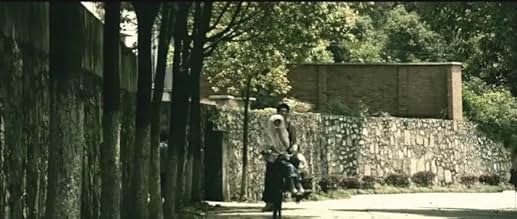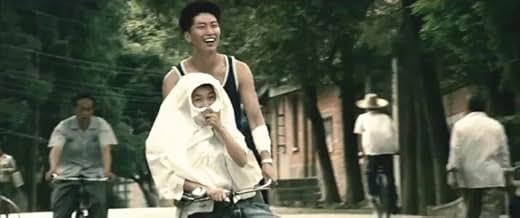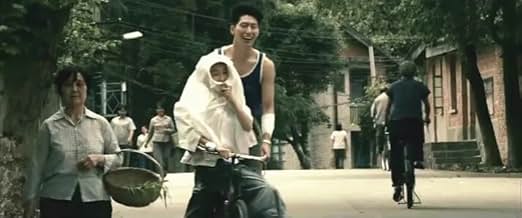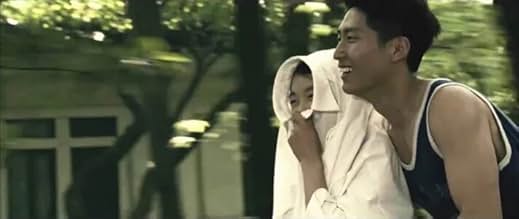Shan zha shu zhi lian
- 2010
- 1 घं 54 मि
IMDb रेटिंग
7.1/10
4 हज़ार
आपकी रेटिंग
अपनी भाषा में प्लॉट जोड़ेंRomance sparks between a young woman and a young man from different economic backgrounds during China's Cultural Revolution of the 1960s and '70s.Romance sparks between a young woman and a young man from different economic backgrounds during China's Cultural Revolution of the 1960s and '70s.Romance sparks between a young woman and a young man from different economic backgrounds during China's Cultural Revolution of the 1960s and '70s.
- पुरस्कार
- 10 जीत और कुल 12 नामांकन
Jinsong Wang
- Director Li (Li Zhuren)
- (as Qi Ke)
Liping Lü
- Wei's Mother (Weihong Muqin)
- (as Liping Lv)
फ़ीचर्ड समीक्षाएं
Quietly moved, go to feel the innocence. The touching love almost made me cry. I believe many people will be moved.
With his many recent works that are nothing short of being opulent, and an Olympic project that was sheer spectacle, director Zhang Yimou still shows he has what it takes to take it down some notches in telling a simple, but no less emotional, tale of first love and romance, set during the Cultural Revolution in 60s and 70s China. It is this historical setting that perhaps piqued interest in bringing the Internet novel by Ai Mi onto the big screen, which lifts it beyond a typical romantic weepy.
Starring newcomer Zhou Dongyu - mind you Zhang Yimou has this knack of bringing new faces to the scene - and Shawn Dou as the star crossed lovers Jing and Sun respectively, the story tackles both the saccharine sweet moments that the duo have to steal away from society's prying eyes, and that of objections that come from Jing's mother. It's a time when Chairman Mao is very much revered, and the story takes aim at how his policies impacted the ordinary man on the street, giving rise to complications on survival matters, especially if you're deemed an intellect and are sent to be re-educated as with Jing's father, held as a political prisoner, and her teacher mom into becoming a school cleaner, earning extra through the folding 1000 envelopes for a single cent.
Constantly cautioned on her family's lack of status and being under the scrutiny of the powers that be, hopes are pinned on Jing as the next generation to lift their family's plight, since there are also two other younger siblings to take care of, rather than to spend time in romantic affairs of the heart with Sun. But undeterred, both parties forge on despite the rich and poor, have and have not divide, with Sun's more privileged background meant a lot more giving on materials on his end to ensure that his loved one makes it through what life has dished out to her under the current circumstances.
The story also doesn't shy away from the airing of grouses, which is probably quite unheard of and bordering on treason too, at least for its time when such statements get made in hushed tones. While one can be quite gung ho about it as proclaiming one's love for another, it's another ball game altogether when taking pot shots at an establishment. The secrecy of the lovers relationship provide ample moments for the usual tried and tested formula of stolen glances, growing into more daring meets involving some frolicking into a river, and moments of temptation when they're all but alone in a rented room.
Having the lovers meet when Jing was sent to the countryside as part of curricular and Sun being attached to a geological project meant the film can bask in a lot of lush landscapes brought out by beautiful cinematography. The art direction was top notch to make this period piece believable, and some of the best moments in the film occur when little things get detailed and time spent to showcase it, such as the amount of propaganda posters pasted on walls, as well as that of a rousing morale boosting song performed by the students with aplomb, even if some of them do not quite actually harbour the same sentiments as what's being sung out loud.
The fresh faced leads also breathed some life into what would be a typical narrative of a romantic weepy. Zhou Dongyu is excellent as the innocent and wide-eyed girl who takes on a very firm stance against her mother's wishes, putting a risk in jeopardizing her family's fate, and that of her own future, should she be found out. Shawn Dou plays his hunky character of the almost perfect man with that steely determination of wanting the best for his loved one, yet being presented with a dilemma of a request made by an elder, which I'm sure many guys out there would share in similar emotions if put in the same boat. At some angles he reminded me of a certain television actor in Singapore as well, but blessed with better acting ability.
In a way the story's quite sprawling, and not everything from the novel can be filmed without sacrificing pace, and this accounted for the very frequent use of intertitles to split the scenes into logical chapters. I would rank this as one of Zhang Yimou's more accessible films, and certainly one that shows he's more than capable to tackle a rather straightforward tale no lacking in powerful emotions and melodrama. Recommended!
Starring newcomer Zhou Dongyu - mind you Zhang Yimou has this knack of bringing new faces to the scene - and Shawn Dou as the star crossed lovers Jing and Sun respectively, the story tackles both the saccharine sweet moments that the duo have to steal away from society's prying eyes, and that of objections that come from Jing's mother. It's a time when Chairman Mao is very much revered, and the story takes aim at how his policies impacted the ordinary man on the street, giving rise to complications on survival matters, especially if you're deemed an intellect and are sent to be re-educated as with Jing's father, held as a political prisoner, and her teacher mom into becoming a school cleaner, earning extra through the folding 1000 envelopes for a single cent.
Constantly cautioned on her family's lack of status and being under the scrutiny of the powers that be, hopes are pinned on Jing as the next generation to lift their family's plight, since there are also two other younger siblings to take care of, rather than to spend time in romantic affairs of the heart with Sun. But undeterred, both parties forge on despite the rich and poor, have and have not divide, with Sun's more privileged background meant a lot more giving on materials on his end to ensure that his loved one makes it through what life has dished out to her under the current circumstances.
The story also doesn't shy away from the airing of grouses, which is probably quite unheard of and bordering on treason too, at least for its time when such statements get made in hushed tones. While one can be quite gung ho about it as proclaiming one's love for another, it's another ball game altogether when taking pot shots at an establishment. The secrecy of the lovers relationship provide ample moments for the usual tried and tested formula of stolen glances, growing into more daring meets involving some frolicking into a river, and moments of temptation when they're all but alone in a rented room.
Having the lovers meet when Jing was sent to the countryside as part of curricular and Sun being attached to a geological project meant the film can bask in a lot of lush landscapes brought out by beautiful cinematography. The art direction was top notch to make this period piece believable, and some of the best moments in the film occur when little things get detailed and time spent to showcase it, such as the amount of propaganda posters pasted on walls, as well as that of a rousing morale boosting song performed by the students with aplomb, even if some of them do not quite actually harbour the same sentiments as what's being sung out loud.
The fresh faced leads also breathed some life into what would be a typical narrative of a romantic weepy. Zhou Dongyu is excellent as the innocent and wide-eyed girl who takes on a very firm stance against her mother's wishes, putting a risk in jeopardizing her family's fate, and that of her own future, should she be found out. Shawn Dou plays his hunky character of the almost perfect man with that steely determination of wanting the best for his loved one, yet being presented with a dilemma of a request made by an elder, which I'm sure many guys out there would share in similar emotions if put in the same boat. At some angles he reminded me of a certain television actor in Singapore as well, but blessed with better acting ability.
In a way the story's quite sprawling, and not everything from the novel can be filmed without sacrificing pace, and this accounted for the very frequent use of intertitles to split the scenes into logical chapters. I would rank this as one of Zhang Yimou's more accessible films, and certainly one that shows he's more than capable to tackle a rather straightforward tale no lacking in powerful emotions and melodrama. Recommended!
There is a scene, about two thirds of the way through, in which an older woman, mother to three children, sits down with her eldest daughter and the boy she has fallen in love with, and for about five minutes, they speak to each other. These are hard times – all three know it. At the beginning of the scene, the mother is sceptical. She treats the two as children, with their heads in the clouds. But the conversation develops, and gradually, we realise a change in the mother. She cannot back down – in practical, surviving terms, she is in the right. But she softens her approach, and by the end, even has a kind of basic respect for the two, behind her frosty exterior. For she has seen the love that these two have for each other, and recognised it. It was then that I knew I was watching a great movie
If 'Lola' was a disappointment in the Asia Triennial Film Festival this year, Zhang Yimou's new film – a love story set during the Chinese Cultural Revolution – makes up for it tenfold. It's not very often I get the opportunity to rave about a film like this, as they are so rarely done well; cynicism, plot complication and saccharine cliché at turns are what often makes a love story such as this horrifically superficial and painful to watch. But Yimou knows what he is doing. Arguably the finest working Chinese director (with the masterpieces 'Raise The Red Lantern', 'Hero' and 'House of Flying Daggers' to his name), he has succeeded here in making a beautiful, heartfelt film, spilling over with the love and care that has gone into its production.
Zhang Jingqiu is a student sent to do research and write a report for her school on a small village in Yichang City. She stays with the head of the village and his family. While there, she meets Sun, a geology student. What follows is inevitable. But how delicately rendered it is: Jing is the most beautiful, innocent young woman Sun has ever seen, and Jing, emotional and vulnerable, is amazed by him. Love at first sight! But this isn't as whimsical as it sounds. Yimou hasn't completely forgotten his political ideals and ability for scathing criticism: with this latest endeavour, he explores just how stifled and suffocating Mao's regime was for everyone under his power, and the emotional deadlock that threaten to destroy his protagonists at every turn. Frolicking, even in the most innocent sense of the work, was risky; Sun and Jing are from different classes, exacerbating the issue. Were they to be found out, her life and ambitions to work as a teacher would be ruined.
I was unsure, during the first half of the film, what to think. Yimou makes some interesting structural choices as regarding his narrative – many of the scenes are divided by inter-titles, telling us of an event we are not allowed to see, and then moving on to its aftermath. Most directors would die before doing this – especially in a film requiring the emotional impact this needs – and, I admit, I doubted its benefits at first. But instead of hindering the drive of the plot, Yimou has used it in such a way – not to cut the film into a digestible running length, but simply to avoid over melodramatics, and focus (almost entirely) on the couple in question. Supplementary information is given to us by other means – the filmed scenes are belong exclusively to Yimou's exploration of our two protagonists' relationship. It works perfectly.
Of course, we all know the rules. Both lovers are alive at the beginning; the same cannot be said after the end credits begin to roll. What makes this movie so wonderful isn't its startling originality; it isn't going to revolutionise cinema as we know it, or spark off long lasting controversy. Rather, what we are offered is a little less prestigious, but by no means less special. What we find is emotional honesty – when we start to cry at the end, we don't feel cheated; instead, we revel in the director's success. More importantly, though, we have felt for his characters, having engaged with them completely, and have a kind of renewed respect for the kind of pure, unconditional love we have been shown. The film is yet another example of Yimou's mastery of the 'anti-melodrama' – much like his early work, this is incredibly restrained, beautifully measured and patiently observed, shot through with a warmth and tender humanity that shouldn't inspire anything but admiration. Cynics – stay away. But for all the romantics out there (of which I, admittedly, am one), I couldn't recommend this more highly. Simply put, it's exquisite.
If 'Lola' was a disappointment in the Asia Triennial Film Festival this year, Zhang Yimou's new film – a love story set during the Chinese Cultural Revolution – makes up for it tenfold. It's not very often I get the opportunity to rave about a film like this, as they are so rarely done well; cynicism, plot complication and saccharine cliché at turns are what often makes a love story such as this horrifically superficial and painful to watch. But Yimou knows what he is doing. Arguably the finest working Chinese director (with the masterpieces 'Raise The Red Lantern', 'Hero' and 'House of Flying Daggers' to his name), he has succeeded here in making a beautiful, heartfelt film, spilling over with the love and care that has gone into its production.
Zhang Jingqiu is a student sent to do research and write a report for her school on a small village in Yichang City. She stays with the head of the village and his family. While there, she meets Sun, a geology student. What follows is inevitable. But how delicately rendered it is: Jing is the most beautiful, innocent young woman Sun has ever seen, and Jing, emotional and vulnerable, is amazed by him. Love at first sight! But this isn't as whimsical as it sounds. Yimou hasn't completely forgotten his political ideals and ability for scathing criticism: with this latest endeavour, he explores just how stifled and suffocating Mao's regime was for everyone under his power, and the emotional deadlock that threaten to destroy his protagonists at every turn. Frolicking, even in the most innocent sense of the work, was risky; Sun and Jing are from different classes, exacerbating the issue. Were they to be found out, her life and ambitions to work as a teacher would be ruined.
I was unsure, during the first half of the film, what to think. Yimou makes some interesting structural choices as regarding his narrative – many of the scenes are divided by inter-titles, telling us of an event we are not allowed to see, and then moving on to its aftermath. Most directors would die before doing this – especially in a film requiring the emotional impact this needs – and, I admit, I doubted its benefits at first. But instead of hindering the drive of the plot, Yimou has used it in such a way – not to cut the film into a digestible running length, but simply to avoid over melodramatics, and focus (almost entirely) on the couple in question. Supplementary information is given to us by other means – the filmed scenes are belong exclusively to Yimou's exploration of our two protagonists' relationship. It works perfectly.
Of course, we all know the rules. Both lovers are alive at the beginning; the same cannot be said after the end credits begin to roll. What makes this movie so wonderful isn't its startling originality; it isn't going to revolutionise cinema as we know it, or spark off long lasting controversy. Rather, what we are offered is a little less prestigious, but by no means less special. What we find is emotional honesty – when we start to cry at the end, we don't feel cheated; instead, we revel in the director's success. More importantly, though, we have felt for his characters, having engaged with them completely, and have a kind of renewed respect for the kind of pure, unconditional love we have been shown. The film is yet another example of Yimou's mastery of the 'anti-melodrama' – much like his early work, this is incredibly restrained, beautifully measured and patiently observed, shot through with a warmth and tender humanity that shouldn't inspire anything but admiration. Cynics – stay away. But for all the romantics out there (of which I, admittedly, am one), I couldn't recommend this more highly. Simply put, it's exquisite.
I love Chinese cinema and without doubt this was a finely crafted movie BUT I just didn't find it particuarly engaging. It's a love story and very little else. Some parts made me reflect on Communist China and the difficulty of navigating a relationship under a regime where so much needs to be kept secret, which can interfere with the trust-forming process, but otherwise I couldn't find much else to explore. So if you want to go on the ride with them (which really just consisted of lots and lots and lots of superficially romantic moments) then fine, but I was looking for something more. And to have the utterly heartbreaking end for no apparent reason than to tear our hearts out was too heavy of a punchline for such a light setup.
क्या आपको पता है
टॉप पसंद
रेटिंग देने के लिए साइन-इन करें और वैयक्तिकृत सुझावों के लिए वॉचलिस्ट करें
- How long is Under the Hawthorne Tree?Alexa द्वारा संचालित
विवरण
- रिलीज़ की तारीख़
- कंट्री ऑफ़ ओरिजिन
- आधिकारिक साइट
- भाषा
- इस रूप में भी जाना जाता है
- Under the Hawthorne Tree
- उत्पादन कंपनियां
- IMDbPro पर और कंपनी क्रेडिट देखें
बॉक्स ऑफ़िस
- दुनिया भर में सकल
- $2,30,04,431
- चलने की अवधि1 घंटा 54 मिनट
- रंग
- ध्वनि मिश्रण
- पक्ष अनुपात
- 2.35 : 1
इस पेज में योगदान दें
किसी बदलाव का सुझाव दें या अनुपलब्ध कॉन्टेंट जोड़ें
























